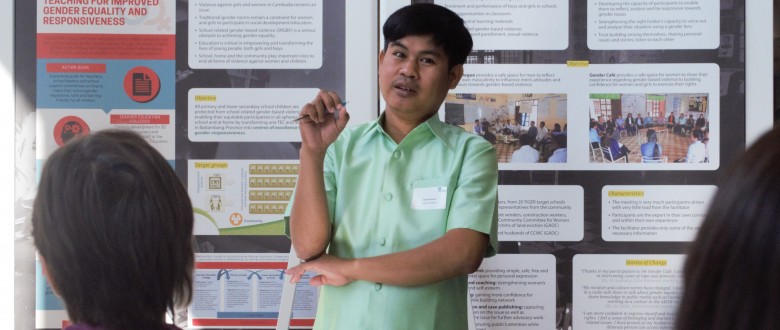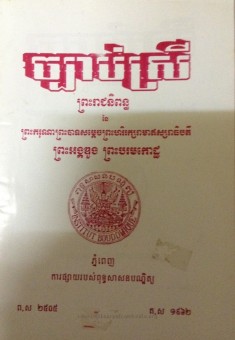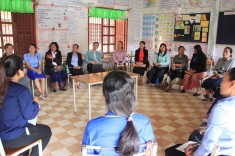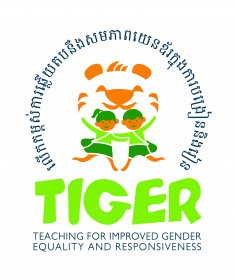
In the TIGER project in Cambodia, VVOB partners with Gender and Development for Cambodia (GADC) to transform schools into centres of excellence for gender-responsiveness. Violence against women is still a very serious issue in the country, and GADC endeavours to challenge age-old cultural norms about what it means to be a man or a woman through constructive and meaningful dialogues. Senior Gender Programme Officer Mr Roeurn Satya (pictured above) shared GADC’s unique approach at an eNSPIRED event about gender in Brussels.
Chbab Srey vs. Chbab Proh
In Khmer, ‘chbab’ means ‘code’, ‘srey’ means ‘woman’, and ‘proh’ means ‘man’. Chbab srey and chbab proh are very important pieces of century-old Khmer literature that outline what it means to be a girl or a boy, a man or a woman. What follows is a translated excerpt from the chbab srey (right):
You must serve and respect your husband at all times and above all else. You cannot touch your husband’s head without first bowing in respect. You must prove your patience and never respond to your husband’s anger. School is more useful for boys than girls. A woman’s place is at home tending to her husband and children. (source: Khmer Institute)
The chbab proh, in contrast, is much less strict and barely refers to a man’s role as a husband. Rather, it promotes values such as courage, leadership, strength and respect towards elders.

Harmful norms
In Cambodia, many girls and women still learn these poems from their families or other influential people in their communities. And until 2007, when the Cambodian Ministry of Women’s Affairs called for its removal from the curriculum, the chbab was taught in schools. Today, the shorter version is taught to learners in grades 7 to 9, which still includes quotes such as ‘Happiness in the family comes from a woman’, or ‘A woman’s poor character results in others looking down upon her husband’.
Notwithstanding the literary and historical importance of these poems, the expected behaviours dictated are fundamentally unequal for men and women. The chbab srey can even silence women who suffer domestic violence:
Be respectful towards your husband. Serve him well and keep the flame of the relationship alive. Otherwise, it will burn you. Do not bring external problems into the home. Do not take internal problems out of the home. (source: Equal Times)
These traditional gender norms are infused in many layers of Cambodia’s society, and perpetuate gender-based violence. But movements to counteract them are steadily growing. One such movement is led by Gender and Development for Cambodia (GADC), an organisation committed to bring men and women around the table and empower them to speak up about their own attitudes and experiences with regards to gender-based violence in informal meetings called Gender Cafes and Men Dialogues.

Gender Cafes and Men Dialogues
These Gender Cafes and Men Dialogues create safe spaces for women and men respectively to self-reflect, analyse and then voice their concerns about gender-based violence through a gendered lens, without pointing fingers or telling participants what to do. It builds community and trust between peers or colleagues to eventually help each other out of difficult situations or troublesome thought processes. Participants of one meeting come from similar business sectors (e.g. the entertainment industry, the food sector, the education sector etc.) and are persons of relative influence in these sectors.
More concretely, men are stimulated in Men Dialogues to reflect on their own masculinity and how masculine attitudes and behaviours can contribute to gender-based violence. Their awareness grows about their powerful role in society, and how they can use this power to change the unequal status quo. (pictured right: Men Dialogue for teachers)


Conversely, Gender Cafes provide safe, non-judgmental spaces for women to express themselves about their experiences with gender-based violence. The aim is to build their confidence in exercising their human rights. (pictured left: Gender Cafe for female teachers)
In Cambodia’s context, it is wise to keep these forums separated between men and women. There is still a culture of silence where girls and women are hesitant to speak up in public, and where they experience little to no internal empowerment. But GADC endeavours to bring all participants together in a later stage, when timing feels appropriate and safe for all.
In both cases, the meetings are driven by the participants themselves, with very little input from the facilitator. After all, the participants are the experts of their specific context and experiences. Follow-up and coaching are crucial.
TIGER with GADC
With the TIGER project in Cambodia, VVOB invests in the professional development of teachers and school leaders to implement gender-responsive pedagogy in their schools through the Ministry of Education, Youth and Sport and its official institutions. But there is a very important community and outreach aspect too, for which VVOB counts on the expertise of GADC.
Similarly to how GADC works with individuals from the entertainment sector or street vendor business, GADC complements TIGER by bringing together educators – i.e. teachers and school leaders – to discuss gender-based violence in and around schools at a more ‘grassroots’ level.

This is an important aspect of the TIGER project. Self-reflection and constructive dialogue between peers are key in changing deeply set, age-old cultural norms and traditions. Without widespread engagement, sustainable progress cannot be made.
About TIGER
The TIGER project ensures primary and lower secondary school children in Cambodia are protected from school-related gender-based violence, enabling their equitable participation in all spheres of life at school and at home. It is carried out in Battambang Province in partnership with Puthi Komar Organization (PKO), Kampuchean Action for Primary Education (KAPE), Gender and Development for Cambodia (GADC), the Ministry of Women’s Affairs (MoWA) and the Ministry of Education, Youth and Sports (MoEYS). It is co-funded by the European Union and Belgium.
About eNSPIRED
The eNSPIRED programme centres on strengthening Flemish educational partners in responding to questions of diversity and equity in education, and internationalisation. eNSPIRED regularly invites international experts such as Roeurn Satya to provide Flemish educators with new insights and inspiration for equity issues. eNSPIRED is funded by Belgium.




